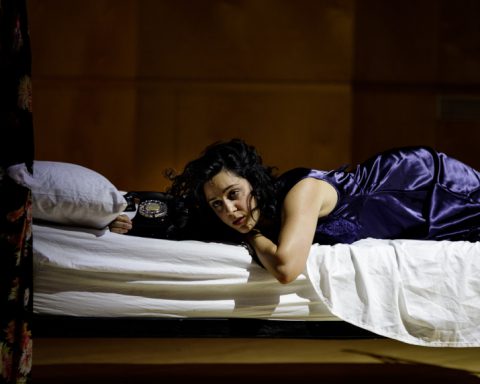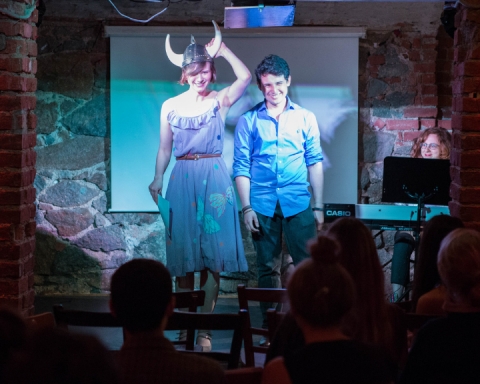Carmen is one of the most famous, most often-played operas, and probably you’ve heard some of its tunes, even if you don’t remember. The composer, Frenchman Georges Bizet (1838–1875), wrote other operas as well as other sorts of music, but Carmen is the only work of his that has really survived.
It also was his last – he died three months after its Paris premiere in 1875 – and in fact, one could say that in Carmen, the composer converted all his talent, skills and experiences into an unsurpassable masterpiece to make himself immortal.
Even the best operatic material can be ruined by the way the producers put it on stage. Very fortunately, at the Leipzig Opera, where Carmen premiered on 30 November, Lindy Hume (direction) and Dan Potra (stage design, costumes) have refrained from imposing on the production that idiosyncratic modernism Leipzig’s Schauspiel is so fond of.
The action on stage unfolds in front of, or between, two grey walls, and the actors / singers wear clothes matching the time and place of the plot – except for the character Escamillo who, in his black fur collar / coat, looks like a mafia godfather rather than a torero.

To be sure, the opera’s plot, though (roughly) based on a novella by prominent French writer Prosper Mérimée (1803–1870), is rather artificial, but this is true of most operas.
Carmen is an attractive, self-assured gypsy working at a cigar factory. She seduces Don José, a soldier of the local guard, and makes him join, like herself, a smuggling gang led by her friends Dancairo and Remendado. Although José follows her, she then leaves him for bullfighter Escamillo. As she refuses to come back to him, José ends up killing her.
But why does she refuse? Playing cards have foretold death for her and José. Do you also doubt that a self-assured woman plunging soldiers into crime would give a damn about the “statements” of playing cards? Well, this is why I called the plot “artificial.”
What really counts in an opera is the music, though it is remarkable that the plot of Carmen takes place in Seville – just like, for example, Rossini’s Barber of Seville (1816), Beethoven’s Fidelio (1814), or Mozart’s Don Giovanni (1787). Yet none of these four operas use that city’s language – Spanish – but rather Italian, German or, in Carmen’s case, French.
Bizet’s librettists Henri Meilhac (1830–1897) and Ludovic Halévy (1834–1908) were able to also make that language sound musical, though managing to keep it natural: “Love has never, never followed any rules,” Carmen sings in her entrance aria; so “If I love you, watch out!”
The nickname of that aria is “Habanera,” and throughout the opera, Bizet’s music is inspired by Spanish, or Hispanic, tunes. Bizet adapted, augmented and arranged them so brilliantly that the three-hour opera never gets boring – which many other composers don’t achieve for even 30 minutes straight.
Already the overture couldn’t be more spectacular. During it, the full Leipzig cast stood on stage, motionlessly watching the audience, which increased the music’s intensity. Then, one hit followed the next.
Contributing their unique share to the beauty are not only the entire orchestra and the singers, but also single instruments such as the bassoon, flute and harp, which have solos (if you listen closely).
Critic Joachim Lange (NMZ – Neue Musikzeitung) found the “traditional” Leipzig production boring, but I say thank you, Hume and Potra, for respecting Bizet. They wouldn’t need to violate him anyway, because they’re able to subtly express the personal messages they do have, within that respect and tradition.

For instance, in Act I, when Carmen and the other women working at the factory step outside to take a break, the soldiers and other men gather to ogle them, but the women remain on stairs – above the men on the ground. We understand who, in the producers’ concept, the stronger sex is. In Act II, when Carmen flirts with Escamillo, the bullfighter, she wears a red dress – and we understand the allure that she has on men.
Lange was “disappointed” also by the Gewandhaus Orchestra conducted by Matthias Foremny, as well as Wallis Giunta’s rendition of the title role, because she displayed “too little passion.” Ironically, critic Peter Korfmacher (LVZ – Leipziger Volkszeitung) liked exactly that about Giunta’s Carmen – her being “not temptation itself turned into sound, but more reflected, complex”, almost “intellectual.”
I agree that in Giunta’s acting there were some stiff moments, and in general, her voice and appearance may be a little youthful for this role. However, in contrast to Lange and also Korfmacher, I found no other fault with the singers, choirs, or orchestra.

Above all, I don’t share Lange’s impression that the audience “denied” Giunta their applause for her “Habanera” – there simply was no time for it in this opera’s rapid succession of highlights.
Moreover, I was quite impressed by the production’s use of light and shadow, although light designer Matthew Marshall wouldn’t have needed to point blinding beams at us at the beginning of Act III.
If you don’t usually go to the opera and want to give it a try, go and see Carmen in Leipzig on 22 December or on one of its subsequent dates, because there you’ll see what “opera” – that peculiar mix of literature, theatre and music – can and should accomplish.
However, if you’re an expert, whether or not you’ll appreciate the show will, as illustrated by the critics’ contradicting each other, depend on your personal taste.









